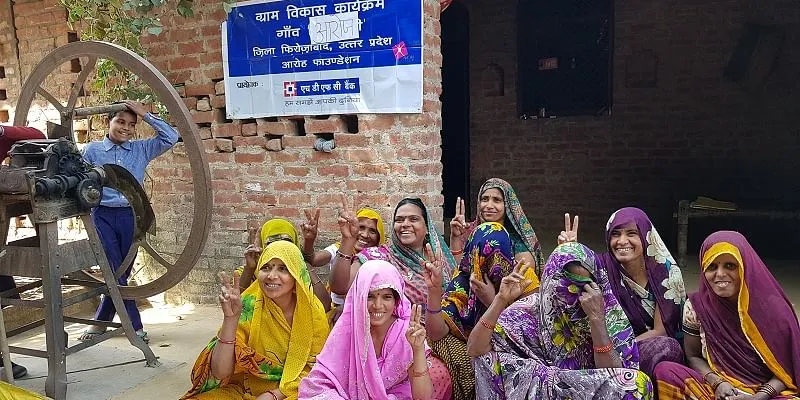Meet Dr Neelam Gupta, the social entrepreneur empowering women and youth of marginalised communities
Dr Neelam Gupta runs the AROH Foundation, which takes up need-based interventions, directly benefitting the women and youths of marginalised and vulnerable communities.
After a successful tenure as an entrepreneur, Dr Neelam Gupta established AROH (A Ray of Hope) Foundation to realise her childhood dream of creating a positive change in society.
Set up in 2001, initially focused on providing research and strategy planning support to Indian government-run programmes.
Realising the need for development work at the grassroots level, she enabled the organisation to take up need-based interventions, directly benefitting the marginalised and vulnerable communities.

It conceptualised, planned, and developed innovative approaches to harness the power of science and technology towards their development.
For over two decades, this Noida-based foundation has been working on skill development, livelihood generation, access to basics — education, health, water, and sanitation — and vast holistic rural development projects in over 18 Indian states — ranging from tough terrains of Meghalaya to Naxal impacted regions in Chhattisgarh, to aspirational districts of Sitamarhi, Bihar.
Becoming a social entrepreneur
"If entrepreneurship is a difficult life, social entrepreneurship can be more difficult,” Neelam, the Founder-President and CEO of AROH Foundation, tells SocialStory.
She continues, “My parents found it “stupid” to think of charity when we could barely survive with my father's meagre salary. I was asked to achieve financial stability and wait for the right moment to give wings to my dream."
For almost a decade, she ran a printing and publishing business that gave her good financial standing. She also earned a PhD in Agricultural Sciences from Delhi University.
“After I got married, I took up many turnkey projects with the government, which gave me a good understanding of gender, poverty, inequality, and the like,” she says.
In 2008, Neelam decided to work in the country's poorest and most backward areas. She employed two girls and started work in Gharbara village in Gautam Budh Nagar near Noida.
The village suffered from poverty, ignorance, health and sanitation, skills for youth and women, agricultural problems, etc. Women, too, faced extreme discrimination and oppression from the backward community.
Initially funded through her personal savings, now AROH Foundation is supported through government grants and CSR funds.
Helping the marginalised
AROH was established with the mission to provide effective assistance to the underprivileged, weak, and marginalised individuals and communities, especially women, in rural and semi-rural areas and slums to alleviate poverty.
“The vision is for the empowerment of the underprivileged and deprived communities and to see their development creates a productive force for the process of national development,” explains Neelam.
Education as its core focus, the foundation provides skills development training to women and youth across India, helping them set up a livelihood for themselves besides farming activities.

Mask making during Covid helped SHGS ladies in sustaining COVID economic crisis
Today, with over 300 employees and volunteers, AROH Foundation has provided skill development training to over 50,000 poor and unemployed youth, empowered more than 25,000 women, and enrolled nearly 35,000 out of school children in formal schools.
Focusing on women empowerment, girl education, and gender mainstreaming, the foundation also runs government-recognised social development projects such as — Padho Aur Badho, Garima, Udaan, and Utkarsh.
Additionally, AROH offers awareness and access to proper health and sanitation facilities. Amidst COVID–19, AROH channelised its resources and expertise on-ground, especially in rural areas, to enable communities to fight the pandemic by providing safety kits, ration kits, and livelihood, and arranging extensive awareness campaigns.
To date, the foundation has built over 10,000 individual household units, 6,000 solar-powered street lights, and 250 solar water filtration units in more than 100 Indian villages.
The intervention has directly benefited and empowered thousands of underprivileged households, enabling them to access basic needs such as water and sanitation.
Edited by Suman Singh


![[Monday Motivation] Meet Himani Nautiyal, the wildlife researcher improving the socio-economic status of Himalayan women farmers](https://images.yourstory.com/cs/5/79900dd0d91311e8a16045a90309d734/MM-and-SS-1635688292132.png?fm=png&auto=format&h=100&w=100&crop=entropy&fit=crop)





